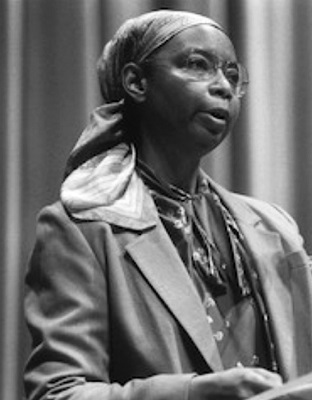De Amerikaanse dichteres en schrijfster Gayl Jones werd geboren op 23 november 1949 in Lexington, Kentucky. Ze kwam uit een creatieve achtergrond; haar grootmoeder Amanda Wilson schreef religieuze drama’s en haar moeder Lucile schreef fictie. Tegen de tijd dat ze zeven jaar oud was, was ze al begonnen met het schrijven van haar eigen fictie. Op de middelbare school werd Jones door haar leraren beschreven als briljant, maar pijnlijk verlegen. Jones studeerde Engels aan Connecticut College, waar ze verschillende prijzen ontving voor haar poëzie en in 1971 een bachelorsdiploma behaalde. Daarna volgde een masterdiploma in creatief schrijven aan de Brown University, terwijl ze studeerde bij William Meredith en Michael Harper en waar haar eerste toneelstuk, “Chile Woman”, werd opgevoerd. In 1973 behaalde zij haar masterdiploma en vervolgde ze haar studie aan Brown, waar ze uiteindelijk een Ph.D. in creatief schrijven behaalde in 1975. Jones publiceerde datzelfde jaar haar eerste roman, “Corregidora”, en een jaar later werd ze assistent-professor aan de Universiteit van Michigan. Tot Jones’ latere werken behoren “Eva’s Man” (1976), “White Rat” (1977), “Song for Anninho” (1981), “The Hermit-Woman” (1983), “Xarque and other Poems” (1985), “Liberating Voices: Oral Tradition of African American Literature” (1991 ), “The Healing” (1998) en “Mosquito” (1999). “The Healing” was finalist voor de National Book Award in 1998.
Uit: Eva’s Man
“The police came and found arsenic in the glass. but I was gone by then. The landlady in the hotel found him. Shc went in bringing him the Sunday’s paper, and wanting the bill paid. They say she screamed and screamed and woke up the whole house. It’s got a bad name now, especially that room. They tell me a lot of people like to go and look at it. and see where the crime happened. They even wrote an article about it in one of these police magazines. That’s the way they do, though. I never did see the article. It bothered me at first when I found out they’d used his picture in there, one showing what I did. It didn’t bother me so much having mine in there. Elvira said they had my picture in there and my hair was all uncombed and they had me looking like a wild woman. Elvis’s the woman in the same cell with me down at the psychiatric prison. They let her go out more than they do me because they say she’s got more control than I have. It ain’t nothing I’ve done since I’ve been in here. It’s what I did be-fore I came, the nature of my crime that makes them keep me in here. The way they look at me. They don’t let me out with the other women. When Elvira goes out, she reads the papers and comes back and tells me what’s in them. She wanted to bring me that article but they wouldn’t let her bring it to Inc. I wanted to see it at first, but then when she sneaked it in with her down in her underwear, I wouldn’t look at it. I made her tear it up and flush it down the toilet.
“You know, they thought you was going to give that hotel a bad name,” she said. “I mean, a bad name where wouldn’t nobody wont to come and stay in it. But now it turns out that they’s some queer people in this world.” “What do you mean?” I was frowning. “I mean, they’s people that go there just so they can sleep in the same place where it happened, bring their whores up there and all. Sleep in the same bed where you killed him at. Some peoples think that’s what you was. A whore.” I kept frowning. “It ain’t me saying it.” I lay on my cot and stared up at the ceiling. There were also people saying I did it because I found out about his wife. That’s what they tried to say at the trial because that was the easiest answer they could get. I’ve seen his wife, though. I didn’t want to see her because I didn’t know how I was going to feel. She came in to see me only one time during the trial. She was a skinny, run-down-looking woman in a black hat. For some reason, I had expected her to be a big, handsome-looking woman.
She didn’t say anything. She just stood there outside the cell and stared at me, and I stared back. The only thing I kept wondering is how did he treat her. Because it looked like he made her worse than he made me. I mean, if she was as bad-off on the inside as she looked on the outside. She must’ve stood there for close to fifteen minutes, and then left. She didn’t have anything at all in her eyes—not hate not nothing. Or whatever she did have, I couldn’t see it. When she left, I wondered what she saw in mine. Even now people come in here and ask me how it happened. They want me to tell it over and over again. I don’t mean just the psychiatrists, but people from newspapers and things.”

